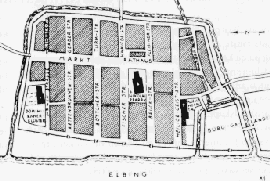Meet the Middle Ages
BackRoyal and Hanseatic towns

As early as in the 11th century, towns were founded in the Nordic countries to make it easier for the Kings to control their kingdoms. The towns brought about new possibilities to collect taxes, to keep an army and to mint coins. Around this time the Nordic countries were christianised. Therefore, the Church often took part in the founding of the towns in the early Middle Ages, for example in Sigtuna, Ribe and Schleswig.
During the 12th and 13th centuries, most towns were founded to gain control over the trade on the Baltic Sea. This way, the King made profits whilst getting better control over his kingdom and better possibilities to collect tax.
The towns were planned like Lübeck, with streets running from the harbour to a square where the church and town hall lay. These towns were eventually governed according to German law. During the 13th century they were under the authority ofthe Hanseatic League, which soon was to control several towns around the Baltic Sea. Lübeck, Visby, Riga, Kalmar, Stockholm, Copenhagen, Rostock and Bergen are examples of such towns.